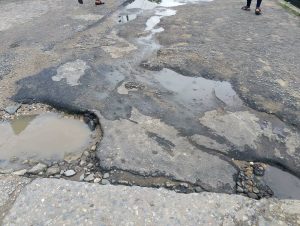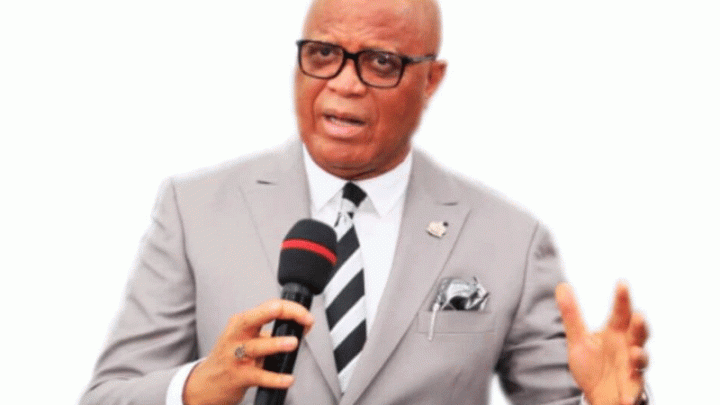By Ibanga Isine
What Akwa Ibom needs now is not just another round of repairs, but a comprehensive road census that provides a data-driven inventory of every major road in the state, along with a concrete management plan.
The Akwa Ibom State Government’s directive to identify and repair potholes across Uyo city was warmly received by the people, especially residents of Uyo, the capital city. After weeks of citizen complaints on conventional and social media, Governor Pastor Umo Eno responded swiftly to the public outcry. As it is my tradition, I want to thank him for not giving a deaf ear to the public complaints. It was a welcome development and a sign that the administration pays attention to the people it serves. But weeks after the directive was given, nothing has changed.
Yesterday, Premium Times, one of Nigeria’s most respected media platforms, published a report on how “Dead fountains, broken roads spark outrage as Akwa Ibom govt spends billions of naira on SUVs for politicians.”
The government was quick to push back through a statement from the Commissioner for Information, Hon. Aniekan Umana. In it, the Hon Commissioner, among other things, frowned at a situation where journalists tend to ignore the positive and major on the minors just to create sensationalism in the policy. He noted that last year, a similar string of reports was published across news platforms, even when the government was swiftly responding to the issue. When the potholes all disappeared, no news media carried he report.
While that claim may sound convenient, it is not entirely accurate. Even when I am not physically in the state, I remain closely connected to developments back home. I regularly track local reports through online platforms and follow news updates via Radio Garden. Last year, when a similar outcry started and the government took action, I listened to programmes on XL FM and Planet Radio where presenters discussed the intervention in detail, applauding the governor for moving swiftly to address the worsening potholes.
What is always predictable, however, is the response from those who prefer propaganda to reality. Rather than acknowledging constructive, good-faith criticism, some individuals are quick to spin narratives to discredit anyone bold enough to highlight what is actually happening in the state. Yet the intention remains simple: to ensure the administration stays informed and ultimately succeeds.
I once attended a high-level meeting with a former Nigerian president, who offered a rare, honest look into leadership. He stated that he was unaware of certain developments during his time in office because his aides intentionally withheld key information. On various occasions, he said that he only learned about crucial matters by reading the news like everyone else.
His confession revealed the complexities of leadership, particularly in situations where leaders rely substantially on filtered briefings from aides, associates, and political supporters. When information is selectively vetted before it reaches the top, even the best-intentioned leader can be caught off guard by occurrences unfolding under his watch. That is why the governor’s aides should encourage people with constructive ideas to express them openly to the government. But that is not the purpose of this intervention.
The idea that the public must crawl or tremble before those in authority simply because they are carrying out their basic constitutional responsibilities should be discouraged. Ordinary people do not campaign for elected office, nor do they take oaths of office or allegiance. They do not control the Commonwealth or manage public resources; those in power do.
Therefore, public office holders should be eternally grateful to the people for allowing them the opportunity of holding resources and authority in trust. They should not seek reverence, but instead strive to serve with honesty, humility, and accountability.
That said, I want to disagree, with due respect to the governor, regarding fixing the potholes. My take is that while the decision to fix gaping potholes in Uyo would offer temporary relief, it would hardly provide a lasting solution. For instance, the governor allocated a significant amount to fix the same potholes last year, and less than a year later, they have become bad again, and we are still discussing how to address them. What that means is that the government is not doing the right thing. We cannot continue to fix potholes every year on the same road.
The last time I visited, I found that many roads in the capital city, including Aka Itiam, IBB Avenue, Udoette, Sylvanus Okon, parts of Ekpo Obot, Ukana Ofot, and so many others, had aged beyond their intended lifespan. Built decades ago, some during military administrations, these roads were never designed for today’s traffic volumes or the wear and tear caused by modern vehicles. Patching them repeatedly is like applying a bandage to a deep wound. It would help for a moment, but it does not cure the problem.

The deplorable part of Ekpo Obot Street
What Akwa Ibom needs now is not just another round of repairs, but a comprehensive road census. I mean a data-driven inventory of every major road in the state. A road census would function like a health check for the state’s infrastructure. It would document when each road was built, its current condition, traffic load, and structural strength. With this information, the government can make informed decisions about which roads to fix, rebuild, and redesign entirely.
The benefits are enormous. First, it would save money over time. Patching roads that are collapsing underneath is wasteful. A proper census would help the government set priorities—directing funds where they are truly needed. For example, a road like Aka Itiam may require full reconstruction, while a newer road with mild cracks could be resurfaced quickly and cheaply.
You can also read – Defending Individual Integrity in Journalism
Second, it would promote transparency and accountability. Many residents often wonder why some roads remain in poor condition despite repeated attempts at repairs. Making public a database showing the state of major roads and planned interventions would build trust and reduce speculation. When citizens see facts, they are less likely to rely on rumours.
Insert pictures of bad roads here
This is also where the role of communication becomes crucial. Constructive feedback from citizens should be welcomed, not attacked. Sadly, some government aides respond to genuine concerns with hostility—using harsh language or defensive statements that do more harm than good. Such reactions alienate the very people the government is trying to serve.
Governor Umo Eno has shown that he’s different. His quick reaction to the recent outcry over potholes proves he values citizens’ voices over empty praise. What his administration needs now are calm, thoughtful communicators who can explain government actions clearly, admit challenges honestly, and treat every complaint as an opportunity to improve.
The proposed Asset Management Agency could take the lead in conducting this road census, utilising modern technology like drones, sensors, and data analytics, to assess every corner of the state. The findings would form the foundation of a long-term infrastructure plan, not only roads but bridges, drainage systems, and other public assets.
You can also read – Before We Crucify Rufai Oseni
Ultimately, the story of Akwa Ibom’s roads mirrors the story of its people: resilient, enduring, and full of promise. A road census is not just about fixing asphalt—it’s about restoring confidence, safety, and dignity. It’s about ensuring that traders can reach the market smoothly, students can travel to school safely, and every resident can move around the state without frustration.
Governor Eno has taken an important first step by responding swiftly to the people’s concerns. Now, it’s time to take the next bold leap, to plan, to build, and to manage Akwa Ibom’s roads with precision and foresight.
A road census will not only guide smarter spending; it will also signal that this administration is building for the future, where the journey of every Akwa man, woman and child is smoother, safer, and marked with pride.




